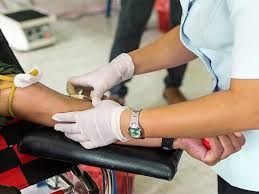The physicians revealed that Nigeria, with a population of over 200 million, requires two million units [pints] of blood annually, but only 150,000 units are available at any given time.
Indeed, at the 2019 World Blood Donor Day, Permanent Secretary at the Federal Ministry of Health, Abdullahi Mashi, stated that at least two million units of blood donation will be critically needed that year alone.
Speaking at the same event, National Coordinator of the National Blood Transfusion Service, Dr Oluwatoyin Smith, revealed that between January and March 2019, a total of 44,722 units of safe blood were available for transfusion in 53 tertiary hospitals across the country.
Identifying culture and lack of awareness as major problems preventing Nigerians from donating blood, the doctors urged Nigerians to change their orientation and cultural perception about blood donation and become regular donors in order to save lives.
Sharing their experiences with PUNCH HealthWise during an interview, the physicians said that blood scarcity had reached a stage where doctors now donate blood to save the lives of patients because there is no blood in the blood bank in most of the nation’s hospitals.
A Consultant Haematologist and Associate Professor at the Lagos University Teaching Hospital, Idi-Araba, Dr. Titi Adeyemo, said the blood supply does not meet demand in the country.
The haematologist said, “Globally, blood supply doesn’t meet blood demand. But the problem is more in Sub-Saharan Africa because we have a poor blood donation culture. So, for that reason, a lot of people are not donating blood, which makes it difficult to meet our blood requirements.
“World Health Organisation has calculated it and has said that for any country or community to be able to meet its blood requirement, 50 per cent of the people must be committed blood donors.
“So, in Nigeria with a population of over 200 million, we need about two million blood donations every year to meet our blood requirement. But we are not even collecting up to 150,000 units. You can see why there is shortage of blood and why lives are being lost because blood is not available.”
Adeyemo stated that besides cultural barriers to blood donation, lack of education and orientation, as well as blood touting, are also contributing to the shortage.
“Perhaps, if people are better educated, then we are going to see more people being committed to blood donation.
“Government needs to spend more on orientation and education of the populace about the importance of blood donation so that we can get more people commited to blood donation. This will help blood to be available in our hospitals for patients requiring transfusion,” she said.
According to her, pregnant women who are giving birth, road traffic accident victims, people with sickle cell disease, as well as cancer patients require lots of blood and transfusion.
Narrating her experience, the haematologist said, “Just this morning, one of our staff told me that a request for one of the components of blood that came in yesterday was about 70 but we were only able to meet 30. You can see the number of people that we did not serve. Our blood requirement in a month in LUTH is about 1,500 to 2,000 units and we are not able to collect up to 1,000 units.
“I have donated blood to save the lives of patients. I have even brought my own son to the hospital to donate blood to save a pregnant woman. So, this is our personal experience all the time.”
A Specialist Registrar and Associate Fellow in Anaesthesia & Critical Care at the Irrua Specialist Teaching Hospital, Edo State, Dr. Julian Ojebo, also told our correspondent that the country lacks blood drive, lamenting that many hospitals in the country do not have blood in their blood banks.
Ojebo, a former first Vice-President of the National Association of Resident Doctors, said it has now become a daily affair for doctors to donate blood to save the lives of patients in critical need because blood and blood products are not available in the blood bank.
He said, “In November 2020, me and six of my colleagues donated blood to save the life of a pregnant woman with Placenta Previa Type Four.
“Two weeks ago also, two senior registrars donated blood to save the life of a patient. Unfortunately, we lost that patient during dialysis.
“It has now become a regular habit for doctors to donate their own blood during emergencies to save the lives of patients because of blood shortage.”
Ojebo also pointed out that due to poor electricity supply in the country, the problem of storage also contributes to blood shortage.
Also speaking, a Consultant Public Health Physician and Chief Executive Officer, Sickle Cell Foundation Nigeria, Dr. Annette Akinsete, said there is no doubt that many lives are lost as a result of lack of access to blood, stressing, however, that the narrative could change if the government and non-governmental organisations create the right awareness and mobilise people to donate blood.
According to WHO, blood transfusion saves lives and improves health, but many patients requiring transfusion do not have timely access to safe blood.
Providing safe and adequate blood should be an integral part of every country’s national health care policy and infrastructure, WHO declares.
source: Punch

 Physicians have decried the acute shortage of safe blood and blood products in the country, revealing that this had led to the deaths of many patients, especially now that insecurity has increased the demand for blood.
Physicians have decried the acute shortage of safe blood and blood products in the country, revealing that this had led to the deaths of many patients, especially now that insecurity has increased the demand for blood.




